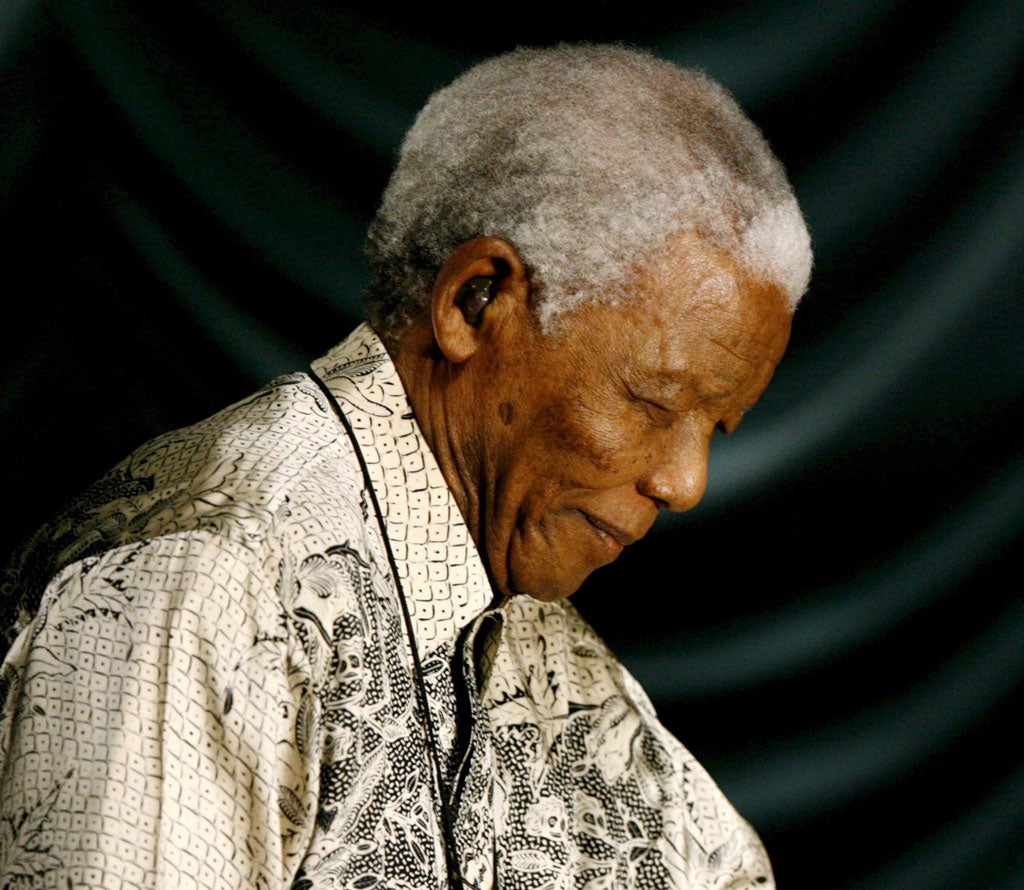Nelson Mandela’s greatness came from the humanity that he radiated
Throughout everything he remained his own man


It was not just his courage and capacity to inspire that endeared Nelson Mandela to so many. Despite being one of the world’s most prominent statesmen – perhaps the most revered of his age – he retained his extraordinary humanity.
When he was with you, you had all his attention, whether you were a President, a mere child, a hotel porter, a cleaner, a waiter or a junior staff member. And he never forgot a friend.
His greatness came from the humanity that he radiated, his common touch, humbleness, self-deprecation, sense of mischief and dignity. Prison could have embittered, adulation could have gone to his head, and egotism could have triumphed. But none of this happened.
Remarkably, his reputation survived and indeed prospered, even under the fierce spotlight of 24-hour news, over-hype and journalistic spin, where (uniquely) he remained untarnished and undiminished, rising above the modern media beast's unrivalled capacity for building up then knocking down. Where most political careers end in failure or opprobrium, Mandela’s continued to soar, long after he had stepped down as President.
Throughout everything, Nelson Mandela remained his own man, not seduced by the trappings of office nor deluded by the adulation of admirers, always friendly and approachable. And that is why he is the icon of icons – and maybe always will be.
His capacity for forgiveness is what made him the absolutely critical figure, first during secret negotiations in the late 1980s from prison with the Afrikaner Nationalist Government, and then after his release.
He was acutely concerned at how close South Africa had come to civil war. In July 1996 Mandela was still reminding the African National Congress at a private gathering of struggle veterans: “You mustn’t compromise your principles, but you mustn’t humiliate the opposition. No one is more dangerous than one who is humiliate.”
Nobody else could have delivered such a healing Presidency in such a bitterly divided country with so much vicious nastiness in its history, still lurking in the shadows of the transition and for years afterwards.
A cathartic piece of Mandela magic was in 1995 when, dressed in the very Springbok jersey and cap blacks used to see as a symbol of apartheid, he presented the rugby world cup to the victorious South African captain, Francois Pienaar. The 62,000 overwhelmingly white Afrikaans spectators, tears streaming, saluted “our President”.
In 1996, when Mandela addressed both houses of the British Parliament in its medieval Westminster Hall, the former Conservative Prime Minister Margaret Thatcher bustled her way to a good seat. “The ANC is a typical terrorist organisation…Anyone who thinks it is going to run the government in South Africa is living in cloud-cuckoo land,” she had said just 10 years before, specifically denouncing him as a “terrorist”. But like all his other former opponents, Mandela forgave her too.
The South Africa he bequeathed has emerged from behind its ugly white veil and proudly taken its rightful place as a leading, perhaps the leading, African state. But overcoming the horrendous legacy of apartheid and achieving a more equal society is inevitably taking much, much longer than many South Africans, as well as the rest of the world, had expected.
A high crime rate affects whites (whereas under apartheid it took place primarily in the black townships). The deliberate apartheid policy of ensuring that black South Africans were prevented from acquiring the education necessary to play their part in the workforce of a modern industrialised society left three quarters of the population lacking the necessary skills, with black unemployment now around 40 per cent, and unlikely to be substantially reduced until the new young black generation has obtained those skills.
Although a new black elite has done well, black workers have not benefited as much as they should have done from the country’s growth and stability since democracy came in 1994. South Africa is ranked high in both the UN’s measure of attractiveness for foreign direct investment and the World Bank’s Ease of Doing Business Index, with strong financial institutions, banks, stock market, and a good corporate governance and regulatory framework. But it is also has a bigger gap between rich and poor than almost any other country.
The ANC of Mandela inspired the world. But there has since been a disturbing collapse in the values and integrity he epitomised. In his last years, he hated the corrosive spread of corruption amongst ANC leaders locally and nationally. Far too many have abandoned his legacy, causing deep disillusion as well as widespread and sometimes daily local ‘service delivery’ protests and strikes.
The contrast with the still basic decency, dedication and principles of the majority of ANC members is stark. So is the fact that the bulk of its policies are still based upon Mandela’s original values. Indeed for those seeking a social democratic agenda in a market economy which presents an alternative to the global gip of neo liberalism, the ANC’s programme is just that.
Perhaps because there is mythology as well as reality about the 'Mandela’s miracle' which made the transition from brutal apartheid to hopeful rainbow democracy, there is a tendency today to see South Africa in far too simplistic – almost black and white – terms.
It is compared to a standard far higher than for example we apply to ourselves in Britain – yet it has much more deeply rooted apartheid heritage of social inequality and economic division.
There is currently pressure to erode Mandela’s legacy, but there are also countervailing pressures from within the ANC and crucially outside, a strong opposition, critical media and a network independent civil society groups. Mandela’s towering stature and vision will nevertheless remain the yardstick by which South Africa’s future will be measured, and his successors inevitably judged.
Peter Hain MP is a former anti-apartheid leader and Labour Cabinet Minister. He is the author of a biography of Nelson Mandela, ‘Mandela’

Join our commenting forum
Join thought-provoking conversations, follow other Independent readers and see their replies